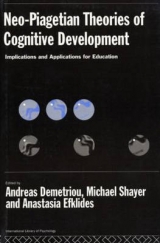
Neo-Piagetian Theories of Cognitive Development
Routledge (Verlag)
978-0-415-05471-3 (ISBN)
- Titel erscheint in neuer Auflage
- Artikel merken
Piagetian theory was once considered able to describe the structure of development of human thought. As a result, it generated an enthusiasm that it could direct education to develop new teaching methods, particularly in science and mathematics. However, disillusionment with Piagetian theory came rather quickly because many of its structural and developmental assumptions appeared incongruent with empirical evidence. In recent years several neo-Piagetian theories have been proposed which try to preserve the strengths of Piaget's theory, while eliminating its weaknesses. At the same time several other models have been advanced originating from different epistemological traditions, such as cognitive/differential psychology or socio-historical approaches. "Neo-Piagetian Theories of Cognitive Development" is unique in representing most of these theories and traditions. Specifically, the authors focus their work on the educational implications of their research.
The chapters are organized in three parts: the first part presents a general model of cognitive development and discusses its implications for different aspects of education; the second part is devoted to learning and cognitive analysis.
Part 1 General Principles of Cognitive Organization and Change and Implications for Education: 1. Cognitive development in educational contexts: implications of skill theory, Thomas R. Bidell and Kurt W. Fischer 2. Modes of knowing, forms of knowing, and ways of schooling, John B. Biggs 3. The role of central conceptual structures in the development of children's scientific and mathematical thought, Robbie Case 4. Social organisation of cognitive development: internalization and externalization of constraint systems, Jaan Valsiner 5. Structural systems in developing cognition, science and education, Andreas Demetriou, et al. Part 2 Inducing Cognitive Change: 6. Problems and issues in intervention studies, Michael Shayer 7. Training, cognitive change and individual differences, Anastasia Efklides, et al 8. Improving operational abilities in children, Ben o Csap o 9. Training scientific reasoning in children and adolescents, Luc Goossens 10. Value and limitations of analogs in teaching mathematics, Graeme S. Halford and Gillian M. Boulton-Lewis 11. Developing thinking abilities in arithmetic class, Lauren B. Resnick et al 12. Causal theories, reasoning strategies and conflict resolution by experts and novices in Newtonian mechanics, J. Ignacio Pozo and Mario Carretero 13. Cognitive prerequisites of reading and spelling: a longitudinal approach Wolfgang Schneider and Jan Carol Naslund Concluding Chapter 14. Returning to school: review and discussion, John B. Biggs.
| Erscheint lt. Verlag | 3.12.1992 |
|---|---|
| Reihe/Serie | International Library of Psychology |
| Zusatzinfo | illustrations, 20 figures and tables, index |
| Verlagsort | London |
| Sprache | englisch |
| Maße | 156 x 234 mm |
| Gewicht | 610 g |
| Themenwelt | Geisteswissenschaften ► Psychologie ► Allgemeine Psychologie |
| Geisteswissenschaften ► Psychologie ► Verhaltenstherapie | |
| ISBN-10 | 0-415-05471-0 / 0415054710 |
| ISBN-13 | 978-0-415-05471-3 / 9780415054713 |
| Zustand | Neuware |
| Haben Sie eine Frage zum Produkt? |
aus dem Bereich



